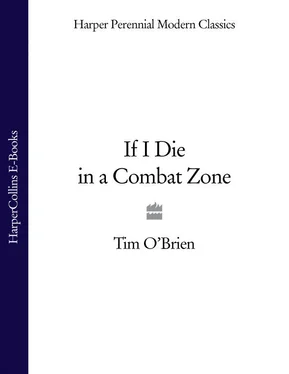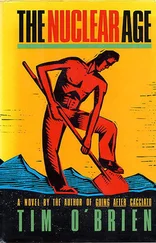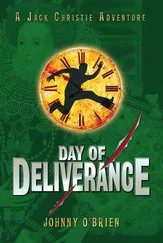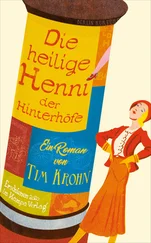We hefted our packs and guns and straggled in a long line out of the village. It was only a two-hundred-metre walk to the little wooded hill where we made our night position, but by the time the foxholes were dug and we’d eaten cold C rations, it had been dark for a long time. The night was not as frightening as other nights. Sometimes there was the awful feeling in the air that people would die at their foxholes or in their sleep, but that night everyone talked softly and bravely. No one doubted that we would be hit, yet in the certainty of a fight to come there was no real terror. We hadn’t lost anyone that day, even after eight hours of sniping and harassment, and the presence of the enemy and his failure during the day made the night hours easier. We simply waited. Taking turns at guard, being careful not to light cigarettes, we waited until nearly daybreak. And then only a half-dozen mortar rounds came down, none of them inside our circle of foxholes.
When it was light Bates and Barney and I cooked C rations together.
‘You need a shave,’ Bates told Barney.
‘I need R & R. And a woman; a lay’s what I need. She can take me with or without whiskers.’
‘You haven’t got whiskers,’ Bates laughed.
Barney rubbed his face, feeling for hair. ‘Well, Jesus, why do you say I need a shave?’
‘Do you ever shave?’
‘Not often.’ Barney stirred his bubbling ham and eggs.
Slowly, the camp came alive. The heat was what woke us up, cooking through the poncho liners. Then flies. Everyone stirred slowly, lay on their backs for long minutes, talked in little groups. At that hour no one really kept guard. A look out into the brush now and then, that was all. A cursory feign. It was like waking up in a cancer ward, no one ambitious to get on with the day, no one with obligations, or dreams for the daylight.
‘That wasn’t a bad night, really,’ Barney said. ‘I was looking for the Red Army to come thunking down on us. A few measly mortar rounds.’
‘Maybe they’re out of ammo,’ Bates said.
‘Could be.’ Barney looked at him, wondering if it were a joke.
‘Sure, we just put their little town in siege and wore them down. A war of fucking attrition, what.’
Barney stared at him. ‘Well, they probably got some ammo left.’
‘Probably.’
‘Did you sleep last night?’ I asked Barney.
‘Sure, I guess so. You know, you get tired walking the whole damn day, so not even the Red Army could keep me from my Zs. You sleep? You looked like you were sleeping; I saw you on guard.’
‘What? I wasn’t sleeping on guard.’
‘I didn’t mean that,’ Barney said, feeling good about inadvertently drawing some blood. ‘I mean while I was on guard. I saw you sleeping pretty well.’
‘Until two hours ago. Something woke me up, sounded like someone trying to kill me.’
‘Must have been a dream.’ Bates turned away.
‘Ah, that wasn’t anything,’ Barney said. ‘They’ll go away soon. We better get saddled up, Johansen looks like he’s fixing to move out.’
We gathered up our gear, stuffed it inside green packs and found our places in the single-file line of march off the hill and into the first village of the day.
I grew out of one war and into another. My father came from leaden ships of sea, from the Pacific theatre; my mother wore the uniform of the WAVES. I was the wrinkled, swollen, bloody offspring of the great campaign against the tyrants of the 1940s, one explosion in the Baby Boom, one of millions of new human beings come to replace those who had just died. My bawling came with the first throaty note of a new army in spawning. I was bred with the haste and dispatch and careless muscle-flexing of a rejuvenated, splendidly triumphant nation giving bridle to its own good fortune and success. I was fed by the spoils of 1945 victory.
I learned to read and write on the prairies of southern Minnesota, in towns peering like corpses’ eyeballs from out of the corn.
Along the route used by settlers to people South Dakota and the flatlands of Nebraska and northern Iowa, in the cold winters, I learned to use ice skates.
My teàchers were brittle old ladies, classroom football coaches, flushed veterans of the war, pretty girls in sixth grade, memories of hot-blooded valour.
In patches of weed and clouds of imagination, I learned to play army games. Friends introduced me to the Army Surplus Store off main street. We bought dented relics of our fathers’ history, rusted canteens and olive-scented, scarred helmet liners. Then we were our fathers, taking on the Japs and Krauts along the shores of Lake Okabena, on the flat fairways of the golf course, writhing insensible under barrages of shore batteries positioned under camouflage across the lake. I rubbed my fingers across my father’s war decorations, stole a tiny battle star off one of them and carried it in my pocket.
Baseball was for the summertime, when school ended. My father loved baseball. I was holding a bleached Louisville Slugger when I was six. I played a desperate shortstop for the Rural Electric Association Little League team; my father coached us, and he is still coaching, still able to tick off the starting line-up of the great Brooklyn Dodgers teams of the 1950s.
Sparkers and the forbidden cherry bomb were for the Fourth of July: a baseball game, a picnic, a day in the city park, listening to the high school band playing ‘Anchors Aweigh’, a speech, watching a parade of American Legionnaires. At night, sometimes after nine o’clock, fireworks erupted over the lake, reflections.
It had been Indian land. Ninety miles from Sioux City, sixty miles from Sioux Falls, eighty miles from Cherokee, forty miles from Spirit Lake and the site of a celebrated massacre. To the north was Pipestone and the annual Hiawatha Pageant. To the west was Luverne and Indian burial mounds.
Norwegians and Swedes, a few Dutch and Germans – Giants in the Earth – had taken the plains from the Sioux. The settlers must have seen endless plains and eased their bones and said, ‘here as well as anywhere, it’s all the same.’
The town became a place for wage earners. It is a place for wage earners today – not very spirited people, not very philosophic people.
Among these people I learned about the Second World War, hearing it from men in front of the courthouse, from men who had fought it. The talk was tough. Nothing to do with causes or reason; the war was right, they muttered when asked, it had to be fought. The talk was about bellies filled with German lead, about the long hike from Normandy to Berlin, about close calls and about the origins of scars just visible on hairy arms. Growing up, I learned about another war, a peninsular war in Korea, a grey war fought by the town’s Lutherans and Baptists. I learned about that war when the town hero came home, riding in a convertible, sitting straight-backed and quiet, an ex-POW.
The town called itself Turkey Capital of the World. In September the governor and some congressmen came to town. People shut down their businesses and came in from their farms. Together we watched trombones and crêpe-paper floats move on a blitzkrieg down main street. The bands and floats represented Lismore, Sheldon, Tyler, Sibley, and Jackson.
Turkey Day climaxed when the farmers herded a billion strutting, stinking, beady-eyed birds down the centre of town, past the old Gobbler Café, past Wool-worth’s and the Ben Franklin store and the Standard Oil service station. Feathers and droppings and popcorn mixed together in tribute to the town and prairie. We were young. We stood on the kerb and blasted the animals with ammunition from our peashooters.
We listened to Nelson Rockefeller and Harold Stassen and the commander of the Minnesota VFW, trying to make sense out of their words, then we went for twenty-five-cent rides on the Octopus and Tilt-A-Whirl.
Читать дальше












